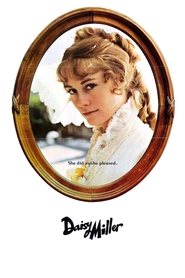If I was ever asked, "what is your most controversial movie opinion?" I would respond that Daisy Miller is a misunderstood masterpiece. Well, perhaps not quite a masterpiece of cinema, but I often struggle to understand why it is just so hated by other critics. For me, it's not that Cybill Shepherd's quote-unquote "bad" acting is "actually the point" in the sense that it was a deliberate choice on behalf of the filmmakers and others are then misinterpreting it. Indeed, that line of argument doesn't especially interest me. Rather, it is what her performance brings to the film that elevates this film from a fairly run-of-the-mill prototype Merchant Ivory adaptation to something that begins to interrogate the orthodox understanding of characters' personalities in nineteenth-century novels, or at least re-examining them through the contemporary lens of neurodivergency. Perhaps it's a stretch, but my argument is not too estranged from discourse over mental illness in Shakespeare. EIther that, or it's fun to indulge in a bit of 19th-century Manic Pixie Dream Girl.
Viewed [in 2024], Daisy Miller does have an added layer of resonance when Bogdanovich’s personal life is read into it, but not due to his romance with Shepherd. The real relevance is his later love affair with Dorothy Stratten, the Playboy Playmate who was brutally murdered by her estranged husband Paul Snider when he learned of her relationship with Bogdanovich. Watching Daisy Miller and its tale of a man unaware of the repercussions of his actions and how they will lead to the loss of the woman he loves, it’s hard not to sense faint reverberations with Bogdanovich’s own story especially since he has acknowledged the parallels himself in interviews.
— Jim Hemphill (IndieWire)
The ending leaves you shocked and sad at its conclusion, over the fate of a character you're never really sure you liked.
— Quentin Tarantino (Cinema Speculation)
You could even make the case that if it wasn’t for the bold, auteur-driven Daisy Miller, we probably wouldn’t have had Martin Scorsese adapting Edith Wharton’s The Age of Innocence in 1993 or Greta Gerwig dropping her version of Louisa May Alcott’s Little Women in 2019. Although it set off his run of box-office turkeys, Peter Bogdanovich’s Daisy Miller basically walked so 19th-century period pieces from Yankee filmmakers could run—and also contend for Best Costume Design Oscars.
— Craig D. Lindsey (Paste Magazine)

